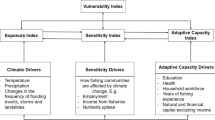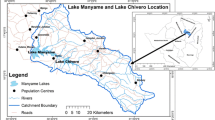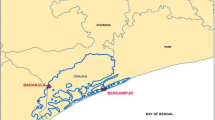Abstract
Fisheries are a leading livelihood portfolio supporting food and income security in developing countries. This study interrogated the susceptibility of fisheries to climate change and their contribution as a livelihood strategy for communities living in Kani ward, Binga. The study sought to evaluate the contribution of fisheries towards the sustainability of household livelihoods and the impact of climate change and multi-stressors on these fisheries-based livelihoods. We adopted a primarily qualitative approach. The results show that fishing is an important livelihood strategy for the Kani ward community. Fisheries were found to be capacitating households with various assets that include livestock, houses, refrigerators, cars and fishing rigs. Furthermore, fishing was found to be contributing to increased food production, household incomes, poverty reduction, better access to education, nutrition and health. Despite the contribution of fisheries as a livelihood strategy, it was found to be susceptible to climate variability and other multi-stressors. Multiple stressors included the cost of fishing permits and hawkers’ licenses, poor infrastructure and COVID-19. The dynamic interaction of these stressors with climate change contributed to the vulnerability of livelihoods based on fisheries. The study concludes that small-scale fishing can buffer marginalised people against shocks since they can enter and exit at a reasonably low cost. In order to address the challenges of climate change, the government needs to develop a climate change adaptation plan specific to fisheries, invest in data on small-scale fisheries, align fishing payment policies and improve household access to natural resources to ensure sustainable use of fisheries as an environmentally viable livelihood strategy.
Access this chapter
Tax calculation will be finalised at checkout
Purchases are for personal use only
Similar content being viewed by others
Abbreviations
- DFID:
-
Department for International Development
- FAO:
-
Food and Agriculture
- HIV:
-
Human Immuno-Deficiency Virus
- IPCC:
-
Inter-governmental Panel on Climate Change
- SSF:
-
Small-Scale Fisheries
- STI:
-
Sexually Transmitted Diseases
- UNSD:
-
United Nations Statistical Department
- ZPWMA:
-
Zimbabwe Parks and Wildlife Management Authority
References
Aiga H, Sadatoshi MS, Kuroiwa S, Yamamoto S (2009) Malnutrition among children in rural Malawian fish-farming households. R Soc Trop Med Hyg 103:827–833
Akuffo SA, Quagrainie KK (2019) Assessment of household food security in fish farming communities in Ghana. Department of Agricultural Economics, Purdue University, West Lafayette, IN
Alison EH, Perry AL, Badjeck MC, Neil Adger W, Brown K, Conway D, Dulvy NK (2009) Vulnerability of national economies to the impacts of climate change on fisheries. Fish Fish 10(2):173–196
Belton B (2021) Fishing and aquaculture: underestimated as a source of income and food. https://www.welthungerhilfe.org/news/latest-articles/2021/fishing-and-aquaculture-as-a-source-of-income-and-food. Accessed 1 Oct 2022
Béné C, Merten S (2008) Women and fish-for-sex: transactional sex, HIV/AIDS and gender in African fisheries. World Dev 36(5):875–899
Bennett NJ, Dearden P, Peredo AM (2015) Vulnerability to multiple stressors in coastal communities: A study of the Andaman Coast of Thailand. Climate Dev 7(2):124–141
Black R, Bennett SRG, Thomas SM, Beddington JR (2011) Climate change: Migration as adaptation. Nature 478:447–449
Creswell JW, Plano-Clark VL (2011) Designing and conducting mixed method research, 2nd edn. Sage, Thousand Oaks
Daw T, Adger WN, Brown K (2009) Climate change and capture fisheries: Potential impacts, adaptation and mitigation. In: Cochrane K, Young DC, Soto D, Bahri T (eds) Climate change implications for fisheries and aquaculture: overview of current scientific knowledge. FAO Fisheries and Aquaculture Technical Paper. No. 530, FAO. Rome, pp 107–150
DFID (2006) Children’s work in fisheries: A cause for alarm? Sustainable fisheries livelihood programme. DFID, London
Dub T, Ncube C, Moyo P, Phiri K, Moyo N (2021) Marginal communities and livelihoods: San communities’ failed transition to a modern economy in Tsholotsho, Development Southern Africa, Zimbabwe. https://doi.org/10.1080/0376835X.2021.1955660
Ellis F (2000) Rural livelihoods and diversity in developing countries. Oxford University Press, Oxford
FAO (2020) The state of world fisheries and aquaculture 2020. Sustainability in action. Rome. https://doi.org/10.4060/ca9229en
FAO (2021) Small-scale fisheries around the world. https://www.fao.org/fishery/en/ssf/world. Accessed 1 Oct 2022
Freduah G, Fidelman P, Smith TF (2017) The impacts of environmental and socio-economic stressors on small-scale fisheries and livelihoods of fishers in Ghana. Appl Geogr 89:1–11
Funge-Smith S, Bennett A (2019) A fresh look at inland fisheries and their role in food security and livelihoods. Fish Fish 20(6):1176–1195
Gandiwa E, Zisadza-Gandiwa P, Mutandwa M, Sandram S (2012). An assessment of illegal fishing in Gonarezhou National Park, Zimbabwe. J Environ Res Manage 3(9):29–37
Gross JM (2018) Document analysis. In: Frey BB (ed), The SAGE encyclopedia of educational research, measurement, and evaluation. SAGE Publications. https://doi.org/10.4135/9781506326139
Hara M, Greenberg S, Thow AM, Chimatiro S, Toit A (2017) Trade and investment in fish and fish products between South Africa and the rest of SADC: Implications for food and nutrition security. Working Paper 47. Institute of Poverty, Land and Agrarian Studies, University of Western Cape
Hecky RE, Mugidde R, Ramlal PS, Talbot MR, Kling GW (2010) Multiple stressors cause rapid ecosystem change in Lake Victoria. Freshw Biol 55:19–42
Hsieh H, Shannon SE (2005) Three approaches to qualitative content analysis. Qual Health Res 15:1277–1288
Ifejika PI, Okunade EO, Ifejika LI, Asadu AM (2012) Physical assets ownership of fisherfolk in fishing communities of Kainji Lake Nigeria: Implications for climate change. J Agri Ext 16(2):92–103
Isaacs M, Onyango P, Akintola SL (eds) (2020) Small-scale fisheries in Africa: A regional portrait. TBTI global publication series, St. John’s, Canada. https://tbti-global.net/
Islam MM, Sallu S, Hubacek K, Paavola J (2014) Vulnerability of fisheries-based livelihoods to the impacts of climate variability and change: Insights from coastal Bangladesh. Reg Environ Change 14:281–294
Limuwa MM, Sitaula BK, Njaya F, Storebakken T (2018) Evaluation of small-scale fishers’ perceptions on climate change and their coping strategies: Insights from Lake Malawi. Climate 6(2):34
Lucas P, Fleming J, Bhosale J (2018) The utility of case study as a methodology for work-integrated learning research. Int J Work Integr Learn 19(3):215–222
Magqina T, Nhiwatiwa T, Dalu MT, Mhlanga L, Dalu T (2020) Challenges and possible impacts of artisanal and recreational fisheries on tigerfish Hydrocynus vittatus Castelnau 1861 populations in Lake Kariba, Zimbabwe. Scientific African 10:e00613
Muringai, RT, Mafongoya, P, Naidoo, D (2020a). The challenges experienced by small-scale fishing communities of Lake Kariba, Zimbabwe. J Transdiscipl Res S Afr 16(1):1–6
Muringai RT, Naidoo D, Mafongoya P, Lottering S (2020b) The impacts of climate change on the livelihood and food security of small-scale fishers in Lake Kariba, Zimbabwe. J Asian Afr Stud 55(2):298–313
Ndebele-Murisa MR, Mashonjowa E, Hill T (2011a) The decline of Kapenta fish stocks in Lake Kariba—A case of climate changing? Trans R Soc S Afr 66(3):220–223
Ndebele-Murisa MR, Mashonjowa E, Hill T (2011b) The implications of a changing climate on the Kapenta fish stocks of Lake Kariba, Zimbabwe. Trans R Soc S Afr 66(2):105–119
Ndhlovu N, Saito O, Djalante R, Yagi N (2017) Assessing the sensitivity of small-scale fishery groups to climate change in Lake Kariba, Zimbabwe. Sustainability 9(12):2209
Nico G, Christiaensen L (2022) New data highlight the hidden jobs effects of small-scale fisheries. https://blogs.worldbank.org/jobs/new-data-highlight-hidden-jobs-effects-small-scale-fisheries. Accessed 1 Oct 2022
Ogutu-Ohwayo R, Natugonza V, Musinguzi L, Olokotum M, Naigaga S (2016) Implications of climate variability and change for African lake ecosystems, fisheries productivity, and livelihoods. J Great Lakes Res 42(3):498–510
Phuong TAH, Ngoan DL, Sen THL, Hong XN (2021) Vulnerability of fisheries-based livelihoods to climate change in coastal communities in Central Vietnam. Coast Manag 49(3):275–292. https://doi.org/10.1080/08920753.2021.1899927
Shava E, Gunhidzirai C (2017) Fish farming as an innovative strategy for promoting food security in drought risk regions of Zimbabwe. Jàmbá: J Disaster Risk Stud 9(1):1–10
Smith LE, Khoa SN, Lorenzen K (2005) Livelihood functions of inland fisheries: Policy implications in developing countries. Water Policy 7(4):359–383
Tweddle D, Cowx IG, Peel RA, Weyl OLF (2015) Challenges in fisheries management in the Zambezi, one of the great rivers of Africa. Fish Manage Ecol 22(1):99–111
UNSD (2022) Conserve and sustainably use the oceans, sea and marine resources for sustainable development. https://unstats.un.org/sdgs/report/2022/Goal-14/. Accessed 1 Oct 2022
Utete B, Phiri C, Mlambo SS, Muboko N, Fregene BT (2018) Fish catches, and the influence of climatic and non-climatic factors in Lakes Chivero and Manyame, Zimbabwe. Cogent Food Agric 4(1):1435018
Utete B, Phiri C, Mlambo SS, Muboko N, Fregene BT (2019) Vulnerability of fisherfolks and their perceptions towards climate change and its impacts on their livelihoods in a peri-urban lake system in Zimbabwe. Environ Dev Sustain 21(2):917–934
World Fish Centre (2010) Gender and fisheries: Do women support, complement or subsidize men’s small-scale fishing activities. Issues Brief 2108.
Yin KR (2018) Case study research and applications: Design and methods, 6th edn. Sage, Thousand Oaks, CA
Author information
Authors and Affiliations
Corresponding author
Editor information
Editors and Affiliations
Rights and permissions
Copyright information
© 2023 The Author(s), under exclusive license to Springer Nature Switzerland AG
About this chapter
Cite this chapter
Nyathi, D., Ndlovu, J., Dube, T., Mathe, P., Mathe, B. (2023). The Vulnerability of Small-Scale Fisheries-Based Livelihoods to Climatic and Non-Climatic Stressors in Kani Ward, Binga, Zimbabwe. In: Leal Filho, W., Kovaleva, M., Alves, F., Abubakar, I.R. (eds) Climate Change Strategies: Handling the Challenges of Adapting to a Changing Climate. Climate Change Management. Springer, Cham. https://doi.org/10.1007/978-3-031-28728-2_30
Download citation
DOI: https://doi.org/10.1007/978-3-031-28728-2_30
Published:
Publisher Name: Springer, Cham
Print ISBN: 978-3-031-28727-5
Online ISBN: 978-3-031-28728-2
eBook Packages: Earth and Environmental ScienceEarth and Environmental Science (R0)




